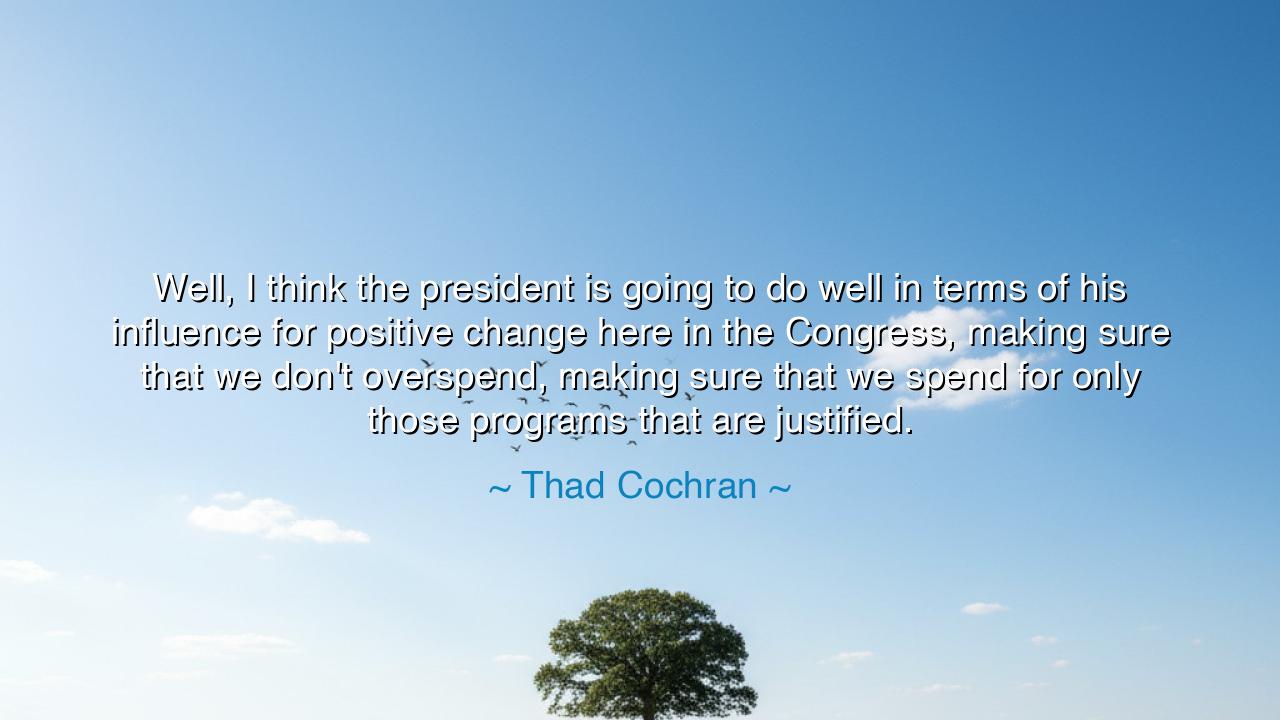
Well, I think the president is going to do well in terms of his
Well, I think the president is going to do well in terms of his influence for positive change here in the Congress, making sure that we don't overspend, making sure that we spend for only those programs that are justified.






Thad Cochran, seasoned voice of the Senate, once declared: “Well, I think the president is going to do well in terms of his influence for positive change here in the Congress, making sure that we don’t overspend, making sure that we spend for only those programs that are justified.” In these words lies the ancient wisdom of stewardship. He speaks of positive change, not as grand visions written in fire, but as the discipline of guiding a nation’s treasure with prudence, so that excess does not consume the people and only what is worthy receives the fruit of their labor.
The essence of his teaching is this: leadership is not merely the pursuit of glory, but the careful balance between abundance and restraint. To overspend is to burden the future with chains of debt, while to justify every program is to ensure that no coin is wasted, no sacrifice is squandered. This is the task of rulers from the dawn of time—to act as guardians of the people’s resources, neither hoarding with miserliness nor scattering with folly.
History gives us a clear mirror in the tale of Cato the Elder of Rome. As censor, he strove to keep the Republic disciplined, railing against waste and luxury, insisting that public funds be spent only on what strengthened the state. His sternness may have seemed harsh, yet it was born from the same principle Cochran describes: that unchecked spending corrodes virtue and weakens nations. Cato’s vigilance, like that of every wise steward, was aimed not at denying prosperity but at preserving it for generations.
Cochran’s words also remind us that the greatest influence of a leader lies not in force, but in persuasion. The president he describes is one who shapes Congress through guidance, ensuring that ambition does not outstrip reason. This echoes the ancient idea that the ruler is shepherd, not tyrant—charged with guiding the flock toward fertile fields, not driving them into wastelands of indulgence.
Let this wisdom endure: the wealth of a people is sacred, drawn from their labor, their hopes, their very lives. To spend it without justification is to betray their trust, but to guard it with discipline is to honor them. As Cochran teaches, true positive change comes not from lavish promises, but from the steady, careful hand that ensures every treasure serves the common good. For nations are not destroyed by enemies alone—they are undone when waste devours their strength from within.






HTBui Huyen Trang
Thad Cochran’s take on ensuring fiscal responsibility raises an important debate. On one hand, spending cuts are essential for reducing national debt, but on the other, how do we ensure that such cuts don’t come at the expense of vital programs? Could an overemphasis on ‘justified spending’ lead to the underfunding of areas that are critical but not immediately popular, like environmental protection or scientific research?
GDGold D.dragon
It’s admirable that Cochran advocates for careful, justified spending, but I wonder—who gets to decide what qualifies as a ‘justified’ program? What if important social or welfare programs are deemed unnecessary due to ideological reasons, even though they provide real benefits to vulnerable populations? How do we ensure that the decision-making process remains fair and balanced, especially when political motives can sometimes cloud judgments about what is truly necessary?
TNTran Ngoc Thao Nhi
This statement seems to suggest a more cautious and disciplined approach to budgeting, but can we trust that such restraint won't hinder progress? For example, cutting funding for certain programs could lead to long-term consequences. How do we decide which programs are truly 'justified'? Could the push for fiscal restraint lead to underfunding vital social programs that directly affect people's lives, such as healthcare and education?
PGNguyen Thi Phuong Giang
Cochran’s comment on the president's influence in controlling government spending is interesting, but how realistic is it to expect Congress to align with the president’s agenda on spending cuts? What happens when both sides have conflicting priorities? Is it possible to maintain a balance between reducing overspending while still meeting the nation’s needs? Or does this mindset risk neglecting essential services that might not always be seen as 'justified' in the short term?
MMMin Min
Thad Cochran’s statement about the president’s role in influencing Congress raises an important point about fiscal responsibility. While it's essential to ensure that spending is justified, how do we draw the line between necessary programs and those that are deemed expendable? Could this focus on spending cuts overlook critical areas like education, healthcare, and infrastructure? Is there room for flexibility in how we define ‘justified’ programs?